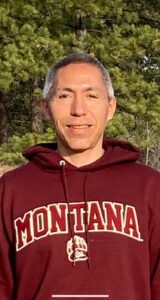Resurrecting the Ojibwe language
Resurrecting the Ojibwe language
By Clara Caufield, Northern Cheyenne
Native Sun News Today Correspondent
If Mike Geboe, (Thunder Bird Feathers) has anything to say about it, the Cree (Neyio) language will stay alive, and even flourish in the hearts, spirits and on the tongues of tribal members on the Rocky Boy’s Reservation, Montana.
This seasoned educator who has both bachelors and master’s degrees and much experience in traditional school settings, now devotes himself to the preservation of the Neyio language, still alive but not in in common coinage among the young. He is also assisting in the resurrection of the Ojibwe language which vanished from the Rocky Boy’s reservation when the last speaker, Duncan Standing Rock died in 2021.
Thunder Bird Feathers is one of a small group of “Class Seven” Tribal language instructors, certified by the Montana Office of Public Instruction, qualified to teach in Montana public schools. Tribal languages are currently taught in 17 Montana public schools on or near the Montana reservations due to the Montana Language Preservation Act, enacted in 2013 by the Montana State Legislature. However, there are not yet any standard methodologies on how to teach a tribal language, especially as the many of the languages, until recently, were oral. Though teachers have access to tribal language dictionaries and other resource material, they must each develop a teaching strategy which suits the language, environment, and the instructor’s personal style of teaching. This article focuses on the unique methods which Geboe has developed. Future installments will look at strategies of other successful tribal language teachers in Montana.
Though Ojibwe/Cree on the maternal side and Northern Arapaho on the paternal side, Geboe was born and raised on the Rocky Boy’s reservation and thus identifies primarily with the Neyio, having been immersed in that language, culture and ceremony. Yet, he still does not claim to be totally fluent as many words, concepts, particularly those related to the ceremonial ways can take a lifetime to fully comprehend and internalize.
He has a wealth of work experience: ideal preparation to be a mentor and coach of language learning, what young ones often call a “grandfather.” He has worked as an addiction counselor, classroom teacher, remote independent contractor for the Boston Medical Center, an intern in New Zealand collaborating with the Māori peoples, gaining ideas for effective language teaching and at Stone Child Community College assisting students to pursue careers in mental health.
He spent a year as the tribal language instructor at the Box Elder School at Rocky Boy working with students from the pre-kindergarten to 11th grade levels. Unfortunately, as too often happens at the discretion of local school boards, tribal language instructors, though certified by the State, are not paid on par with other certified teachers, often compensated as teacher aides. Thus, Geboe who has children to provide for accepted a position with the Rocky Boy Tribal Indian Department of Education, where he now spearheads community-based tribal language instruction, in which people of ages participate.
Jonathon Windy Boy, State Representative and Director of the Rocky Department of Indian Education said about Geboe: “He is drug/alcohol free. His passion is for our effort. It really makes a difference. He was one of the last to get certified in the Ojibwe language. That hearkens old dreams when our ancestor first saw “coming of the fair-skinned men.” They advised our people to go to the backbone of Turtle Mountain (Rocky Mountains). That why there are many Ojibwe in Montana. Along that long trek, one band went to Canada, originally part of our Tribe. When time is right band, the old ones said, the bands will come back together. That is happening now as we reach out to them to reconstruct the language here in Montana.
Evey once in awhile you see a person who has passion for what they do. Even though Mike is well versed in western education, it is evident his passion and drive is for what he does now. It is phenomenal, I would not trade him in for the world.”
Over the years, Geboe has developed a teaching style based up Neyio philosophy and lifestyle. “We ‘sing’ the Cree alphabet, to catch the tones and inflections. The best learning environment is outdoors, the natural environment. We take walks and point to objects, animate and inanimate, point and learn the words, including the proper voice inflection, such as tree, rock, bird, deer, mountain. They hear the words. The real world is their classroom.”
Total physical response is also effective, that is learning with mind, spirit and body, the Cree theory of ‘being,” he says. In Neyio way there is no separation of church and state, so during classes we smudge, pray and sing. Some of the non-Native teachers, but the students love it, knowing someone cares, “he explained.
This unique instructor has also developed a Tipi Model for the classroom which involves building miniature tipis and sweat lodges, learning the significance of such things as the First Lodge (mother’s womb) on down to the Last Lodge (coffin).
“Praise and affection are the keys to teaching our language and encouraging them,” he concludes. “These young ones are our most precious resource, and I am rewarded when they give me a smile, a giggle or a hug and call me Grandpa or Uncle in Neyio..”
(Clara Caufield can be reached at acheyennevoice@gmail.com)
The post Resurrecting the Ojibwe language first appeared on Native Sun News Today.

